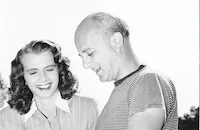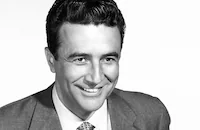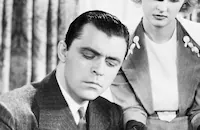Hurricane Island

Brief Synopsis
Cast & Crew
Lew Landers
Jon Hall
Marie Windsor
Romo Vincent
Edgar Barrier
Karen Randle
Film Details
Technical Specs

Synopsis
On Easter day, 1513, a Spanish expedition led by Jose Ponce de León claims a coastal strip of land in the New World in the name of Spain. During the proclamation, the Spaniards are attacked by angry Indians and Ponce de León is injured by a poisoned arrow. The group leaves for Cuba to seek medical advice, and when the Spanish doctor is unable to help Ponce de León, he tells the commander's right-hand man, Captain Carlos Montalvo, to take his leader to the local witch doctor. The witch doctor says that Ponce de León is under the spell of "Hurricane," God of the Winds, and that he must return to the god's secret shrine, a golden fountain of youth, for the cure. Meanwhile, Jane Bolton, a notorious and beautiful pirate leader, learns about the Spaniards planned visit to the fountain of youth and assumes that it must be filled with gold. When Jane's men fail to steal the map to the fountain, she joins a group of women prisoners whom Ponce de León's men have rounded up to help colonize the area for Spain. Jane flirts with Montalvo, hoping to gain access to the map, and as she locks him in a passionate kiss one evening, Jose, one of the crew, calls out that another ship has been spotted. Montalvo strips and swims to the strange vessel as its crew, led by Jane's lover, Angus Macready, climb into small boats. Montalvo torches the pirate ship and jumps into the water just before it explodes. After everyone has landed safely on shore, Macready and the pirates attack the Spanish encampment. During the scuffle, Jane grabs a gun and tries to force Jose to give her the treasure map, but Montalvo arrives and they put Jane in irons. The Indians, led by a young, belligerent warrior named Valco, watch the white men approach, and when Valco expresses the desire to attack them, Okahla, the tribe's leader and high priestess of Hurricane's fountain, insists that there will be no more bloodshed. Meanwhile, Jane tries to run away, but Montalvo captures her. During a wedding celebration for the Spaniards and their convict brides, Montalvo brings Jane food and she begins to admire the gallant Spaniard. When Montalvo goes to investigate strange noises in the jungle, Valco and his renegade braves take him prisoner. Returning with Montalvo to their village, the Indians demand that he show them the secret of the white man's power: firearms. Okahla is furious that Valco is challenging her peaceful rule, and then, to prove her power against the white man's weapon, she has Montalvo shoot her. Montalvo does not use bullets, and the pair successfully fools the Indians into believing that Okahla is invincible. Okahla takes Montalvo back to her tent and, in gratitude, offers to bring him to the fountain as long as he desires only a cure and not gold. Meanwhile, Valco approaches Macready and his pirates, and the two groups decide to join forces against Okahla's braves, who guard the fountain. At the idyllic fountain, Okahla offers Ponce de León a gold goblet filled with the fountain's waters, and he is miraculously cured. Just then, Macready, Valco and their men attack, and Okahla, believing that she has been double-crossed, calls on the god Hurricane to attack. When the winds begin to gust, Valco's men flee in terror and Macready and Montalvo have a sword fight, which Montalvo wins. As the rest of the men flee the hurricane winds, Montalvo forces a reluctant Okahla to leave the fountain. Okahla cannot live without the fountain's waters, however, and when the Spaniards put her into a life boat in the sea, she withers and dies of old age before their eyes. The next day, which is clear and sunny, Ponce de León says that Okahla is not really gone because her philosophy of peace and wisdom will always remain with them. Montalvo and Jane, now in love, listen happily to the great explorer's words.

Director

Lew Landers
Cast
Jon Hall

Marie Windsor
Romo Vincent
Edgar Barrier

Karen Randle
Jo Gilbert
Nelson Leigh
Marc Lawrence
Marshall Reed
Don Harvey

Rick Vallin
Russ Conklin
Alex P. Montoya

Lyle Talbot
Rusty Wescoatt
Zon Murray
Crew

Film Details
Technical Specs

Articles
Hurricane Island
By Richard Harland Smith

Hurricane Island
Quotes
Trivia
Notes
The following written prologue appears in the onscreen credits: "This story is based on history and a legend which has lived through centuries. To tell it, the language of the Indians and the Spaniards has been translated to that of our era." The July 9, 1951 Motion Picture Daily review responds to this prologue with the following: "In fashioning the screenplay, David Mathews seems to have slighted both history and legend, and relied instead on his own fertile imagination."

Miscellaneous Notes
Released in United States Summer July 1951
Released in United States Summer July 1951













